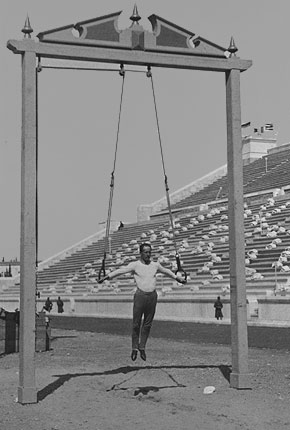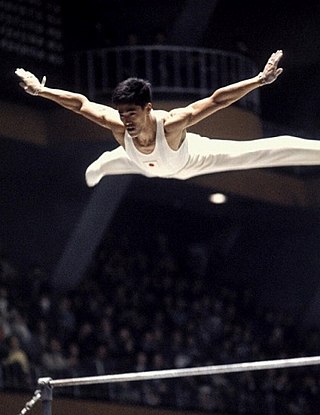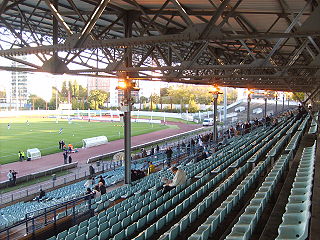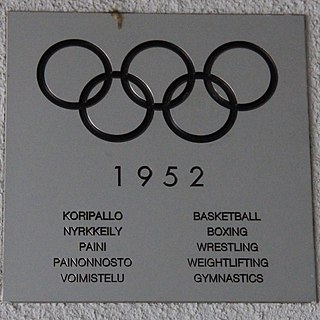At the 2004 Summer Olympics in Athens, Greece, three disciplines of gymnastics were contested: artistic gymnastics, rhythmic gymnastics and trampoline. The artistic gymnastics and trampoline events were held at the Olympic Indoor Hall and the rhythmic gymnastics events were held at the Galatsi Olympic Hall.

The men's horizontal bar was one of eight gymnastics events on the Gymnastics at the 1896 Summer Olympics programme. It was held on 9 April, as the sixth gymnastics event. 15 athletes from four nations entered the competition. Two winners were announced, with Hermann Weingärtner winning his first individual gold medal, which was added to his two team gold medals and his three other individual medals. His countryman, Alfred Flatow, won his first individual medal.

The men's vault was one of the eight gymnastics events on the Gymnastics at the 1896 Summer Olympics programme. The third event, it was held on 9 April. 15 athletes from five nations competed. The Germans captured the gold and bronze medals, while Zutter won the silver for Switzerland.

The men's pommel horse was one of eight gymnastics events on the Gymnastics at the 1896 Summer Olympics programme. The pommel horse was the fourth event held on 9 April. 15 athletes from five nations started the pommel horse exercise. Zutter won Switzerland's first gold medal in this event, with Weingärtner taking the silver.

The men's rings was one of eight gymnastics events on the Gymnastics at the 1896 Summer Olympics programme. The fifth event, it was held on 9 April. There were eight competitors from three nations. The Greeks won the gold and bronze medals, with Hermann Weingärtner winning his fifth medal. Places 1–3 and 5 are known, but 4th place is not—any of the four athletes whose places are not known may have occupied the fourth position.

The men's team parallel bars was the first of eight gymnastics events on the Gymnastics at the 1896 Summer Olympics programme. It was held on 9 April. Three teams took part, one German and two Greek, with the German team winning the competition.

The men's team horizontal bar was the second of eight gymnastics events on the Gymnastics at the 1896 Summer Olympics programme. It was conducted on 9 April. Only one team, from Germany, competed.

The men's individual all-around, also known as the heptathlon, was one of two gymnastics events on the Gymnastics at the 1908 Summer Olympics programme. As suggested by the alternate name, the competition included seven events with the scores summed to give a final score. Each nation could enter up to 20 gymnasts, with France and Great Britain each entering the maximum. A total of 97 gymnasts from 12 nations competed. The event was won by Alberto Braglia of Italy, the nation's first medal in the men's individual all-around. Silver went to Walter Tysall of Great Britain, the first medal for the nation as well. France's Louis Ségura earned bronze.

The men's parallel bars was a gymnastics event contested as part of the Gymnastics at the 1964 Summer Olympics programme at the Tokyo Metropolitan Gymnasium. The event was held on 18, 20, and 23 October. There were 128 competitors from 29 nations, with nations in the team competition having up to 6 gymnasts and other nations entering up to 3 gymnasts. The event was won by Yukio Endo of Japan, the nation's first victory in the parallel bars after two Games with silver and bronze medals. It was the first of a four-Games gold medal streak for Japanese gymnasts in the event. Japan also took silver, with Shuji Tsurumi finishing second. Bronze went to Franco Menichelli of Italy.

The men's horizontal bar was a gymnastics event contested as part of the Gymnastics at the 1964 Summer Olympics programme at the Tokyo Metropolitan Gymnasium. The event was held on 18, 20, and 23 October. There were 128 competitors from 29 nations, with nations in the team competition having up to 6 gymnasts and other nations entering up to 3 gymnasts. The event was won by Boris Shakhlin of the Soviet Union, the nation's first victory in the horizontal bar after two Games with silver and bronze medals. The Soviets also took silver, with Yuri Titov finishing second. Shakhlin and Titov were the fifth and sixth men to win multiple medals in the horizontal bar. Bronze went to Miroslav Cerar of Yugoslavia.

The men's artistic individual all-around was an artistic gymnastics event held as part of the Gymnastics at the 1912 Summer Olympics programme. The competition was held on 12 July at the Stockholm Olympic Stadium. It was the fourth appearance of the event. There were 44 competitors from 9 nations. Each nation was limited to 6 gymnasts. The event was won by Alberto Braglia of Italy, the first man to successfully defend a title in the artistic individual all-around. The bronze medalist from 1908, Louis Ségura, this time took silver. Braglia and Ségura were the first two men to win multiple medals in the event. Italian Adolfo Tunesi earned bronze.

The men's individual all-around competition was one of eight events for male competitors in the artistic gymnastics discipline contested in the gymnastics at the 2004 Summer Olympics in Athens. The qualification and final rounds took place on August 14 and August 18 at the Olympic Indoor Hall. There were 98 competitors from 31 nations. Each nation could enter a team of 6 gymnasts or up to 2 individual gymnasts. The event was won by Paul Hamm of the United States, the nation's first victory in the men's all-around since the 1904 Games in St. Louis and second overall. It was the first medal of any color for an American in the men's all-around since the 1984 Games in Los Angeles. South Korea took two medals, a silver for Kim Dae-Eun and a bronze for Yang Tae Young. The scoring of the final was disputed; Olympedia calls this "the most controversial men's gymnastic event ever."

The men's horizontal bar competition was one of eight events for male competitors of the artistic gymnastics discipline contested in the gymnastics at the 2004 Summer Olympics in Athens. The qualification and final rounds took place on August 14 and August 23 at the Olympic Indoor Hall. There were 79 competitors from 29 nations, with nations competing in the team event having up to 5 gymnasts and other nations having up to 2 gymnasts. The event was won by Igor Cassina of Italy, the nation's first victory in the horizontal bar and first medal of any color in the event since 1928. Paul Hamm took silver, the United States' first horizontal bar medal since 1992. Bronze went to Isao Yoneda of Japan, the once-dominant nation's first medal in the event since 1984.

The men's parallel bars competition was one of eight events for male competitors of the artistic gymnastics discipline contested in the gymnastics at the 2004 Summer Olympics in Athens. The qualification and final rounds took place on August 14 and August 23 at the Olympic Indoor Hall. There were 81 competitors from 31 nations, with nations competing in the team event having up to 5 gymnasts and other nations having up to 2 gymnasts. The event was won by Valeriy Honcharov of Ukraine, the nation's second victory in the parallel bars. Hiroyuki Tomita took silver, putting Japan above the Soviet Union on the all-time medal table for the event. Li Xiaopeng of China became the seventh man to win multiple parallel bars medals with his bronze adding to his 2000 gold.

The men's artistic individual all-around was an artistic gymnastics event held as part of the gymnastics at the 1920 Summer Olympics programme. It was the fifth appearance of the event. The competition was held on Wednesday, 25 August 1920. 25 gymnasts from seven nations competed. Nations had been limited to 6 gymnasts each since 1912. The event was won by Giorgio Zampori of Italy, the nation's third consecutive victory in the men's individual all-around. France's Marco Torrès took silver and Jean Gounot earned bronze, stretching the French podium streak to three Games as well.

The men's parallel bars event was part of the gymnastics programme at the 1924 Summer Olympics. It was one of nine gymnastics events and it was contested for the third time after 1896 and 1904. The competition was held on Sunday, July 20, 1924. Seventy-two gymnasts from nine nations competed. The event was won by August Güttinger of Switzerland, the nation's first victory in the event. Robert Pražák of Czechoslovakia and Giorgio Zampori of Italy earned silver and bronze, respectively.

The men's parallel bars event was part of the gymnastics programme at the 1928 Summer Olympics. It was one of seven gymnastics events for men and it was contested for the fourth time after 1896, 1904, and 1924. The competition was held on Thursday, August 9, 1928. Eighty-five gymnasts from eleven nations competed, with each nation having a team of up to 8 gymnasts. The event was won by Ladislav Vácha of Czechoslovakia, the nation's first victory in the men's parallel bars. The silver medal went to Josip Primožič of Yugoslavia, with Hermann Hänggi of Switzerland earning bronze.

The men's parallel bars event was part of the gymnastics programme at the 1932 Summer Olympics. It was contested for the fifth time after 1896, 1904, 1924, and 1928. The competition was held on Friday, August 12, 1932. Fifteen gymnasts from six nations competed. Each nation was limited to three gymnasts. The event was won by Romeo Neri of Italy, the nation's first victory in the men's parallel bars. István Pelle earned Hungary's first medal in the event with his silver, while Heikki Savolainen similarly earned Finland's first medal with his bronze.

The men's horizontal bar competition at the 1948 Summer Olympics was held at Earls Court Exhibition Centre on 12 and 13 August. It was the seventh appearance of the event. There were 121 competitors from 16 nations, with each nation sending a team of up to 8 gymnasts. The event was won by Josef Stalder of Switzerland, with his countryman Walter Lehmann taking silver. It was the nation's second victory in the event, tying the United States for most all-time. Veikko Huhtanen of Finland earned bronze, giving Finland a three-Games podium streak in the event.

The men's parallel bars competition at the 1952 Summer Olympics was held at Messuhalli, Exhibition Hall I from 19 to 21 July. It was the eighth appearance of the event. There were 185 competitors from 29 nations, with each nation sending up to 8 gymnasts. The event was won by Hans Eugster of Switzerland, the nation's second consecutive and third overall victory in the parallel bars, breaking a tie with Germany for most all-time. Switzerland also took bronze, as Josef Stalder repeated his 1948 third-place performance. The Soviet Union's debut resulted in a silver medal for Viktor Chukarin, who would become the third multi-medalist in 1956.




















